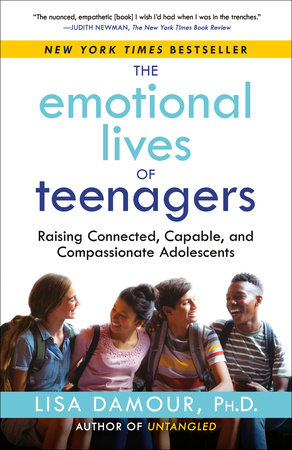The Emotional Lives of Teenagers
Raising Connected, Capable, and Compassionate Adolescents
Lisa Damour, Ph.D.
Paperback
February 20, 2024 | ISBN 9780593500033
AmazonBarnes & NobleBooks A MillionBookshop.orgHudson BooksellersPowell'sTargetWalmart
Hardcover
Bestseller
February 21, 2023 | ISBN 9780593500019
AmazonBarnes & NobleBooks A MillionBookshop.orgHudson BooksellersPowell'sTargetWalmart
Ebook
February 21, 2023 | ISBN 9780593500026
AmazonApple BooksBarnes & NobleBooks A MillionGoogle Play StoreKobo
Audiobook Download
February 21, 2023 | ISBN 9780593668573
About the Book
NEW YORK TIMES BESTSELLER • An urgently needed guide to help parents understand their teenagers’ intense and often fraught emotional lives—and how to support teens through this critical developmental stage—from the author of Untangled and Under Pressure
Dr. Lisa Damour worked as an expert collaborator on Pixar’s Inside Out 2!
“How are we supposed to get our kids through these daunting years? There are countless books on the subject, but The Emotional Lives of Teenagers is the nuanced, empathetic one I wish I’d had when I was in the trenches.”—Judith Newman, The New York Times Book Review
In teenagers, powerful emotions come with the territory. And as teens contend with with academic pressure, social media stress, worries about the future, and concerns about their own mental health, it’s easy for them—and their parents—to feel anxious and overwhelmed. But it doesn’t have to be that way.
Parents who read this book will learn:
• what to expect in the normal course of adolescent emotional development and when it’s time to worry
• why teens (and adults) need to understand that mental health isn’t about “feeling good” but about having feelings that fit the moment, even if those feelings are unwanted or painful
• strategies for supporting teens who feel at the mercy of their emotions, so they can become psychologically aware and skilled at managing their feelings
• how to approach common challenges that come with adolescence, such as friction at home, spiking anxiety, risky behavior, navigating friendships and romances, the pull of social media, and many more
• the best ways to stay connected to their teens and how to provide the kind of relationship that adolescents need and want
With clear, research-informed explanations alongside illuminating, real-life examples, The Emotional Lives of Teenagers gives parents the concrete, practical information they need to steady their teens through the bumpy yet transformational journey into adulthood.
Dr. Lisa Damour worked as an expert collaborator on Pixar’s Inside Out 2!
“How are we supposed to get our kids through these daunting years? There are countless books on the subject, but The Emotional Lives of Teenagers is the nuanced, empathetic one I wish I’d had when I was in the trenches.”—Judith Newman, The New York Times Book Review
In teenagers, powerful emotions come with the territory. And as teens contend with with academic pressure, social media stress, worries about the future, and concerns about their own mental health, it’s easy for them—and their parents—to feel anxious and overwhelmed. But it doesn’t have to be that way.
Parents who read this book will learn:
• what to expect in the normal course of adolescent emotional development and when it’s time to worry
• why teens (and adults) need to understand that mental health isn’t about “feeling good” but about having feelings that fit the moment, even if those feelings are unwanted or painful
• strategies for supporting teens who feel at the mercy of their emotions, so they can become psychologically aware and skilled at managing their feelings
• how to approach common challenges that come with adolescence, such as friction at home, spiking anxiety, risky behavior, navigating friendships and romances, the pull of social media, and many more
• the best ways to stay connected to their teens and how to provide the kind of relationship that adolescents need and want
With clear, research-informed explanations alongside illuminating, real-life examples, The Emotional Lives of Teenagers gives parents the concrete, practical information they need to steady their teens through the bumpy yet transformational journey into adulthood.
Read more
Close




